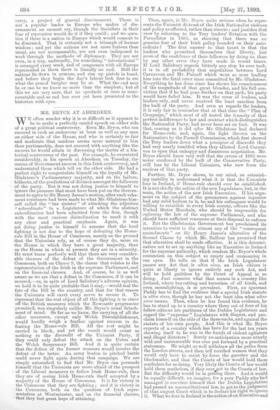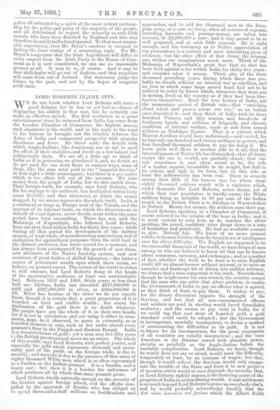MR. BRYCE AT ABERDEEN.
WE often wonder why it is so difficult as it appears to be to make a perfectly candid• speech on either side of a great political controversy. Even Mr. Bryce, who can succeed in such an endeavour at least as well as any man on either side of the House, and who is certainly so fair and moderate that candour seems more natural to him than partisanship, does not succeed with anything like the success he would attain in discussing the merits of a his- torical controversy of the past. For example, he overstated considerably, in his speech at Aberdeen on Tuesday, the omens of Government success in this Irish controversy, and understated those which tell on the other side. He had a perfect right to congratulate himself on the loyalty of Mr. Gladstone's Parliamentary majority, and on the failure, hitherto, of the predictions of division amongst the followers of the party. But it was not doing justice to himself to ignore the pressure that must have been put on the Govern- ment to agree to Sir Henry James's motion, after such vehe- ment resistance had been made to what Mr. Gladstone him- self called the "bar sinister" of attaching the adjective "subordinate" to a Legislature of which the abstract subordination had been admitted from the first, though with the most curious disinclination to mark it with any clear and practical emphasis. Again, it was not doing justice to himself to assume that the hard fighting is not due to the hope of defeating the Home- rule Bill in the House of Commons, merely on the ground that the Unionists rely, as of course they do, more on the House in which they have a great majority, than on the House in which at present they are in a minority. He must know perfectly well that there are very consider- able chances of the defeat of the Government in the Commons, both on Clause 9, the clause that relates to the representation of the Irish in the supreme Parliament, and on the financial clauses. And, of course, he is as well aware as we are that a defeat in the Commons, if it can be secured,—as, in spite of Lord Salisbury's adverse opinion, we hold it to be quite probable that it may,—would seal the fate of the Bill in the country, and that for that reason the Unionists will exert every nerve to secure it. To represent that the real object of all this fighting is to stave off the British measures which the Newcastle programme promised, was singularly unlike Mr. Bryce's usual detach- ment of mind. So far as we know, the carrying of all the other measures, except only Welsh Disestablishment, would hardly weigh a feather against success in de- feating the Home-rule Bill. All the rest might be carried in block, and yet the result would count as nothing to the discredit of the Unionist Party, if they could only defeat the attack on the Union and the Welsh Suspensory Bill. And it is quite certain that the defeat of the former measure would involve the defeat of the latter. An army beaten in pitched battle could never fight again during that campaign. We are simply astonished to find that Mr. Bryce can persuade himself that the Unionists are more afraid of the prospect of the Liberal measures to follow Irish Home-rule, than they are of seeing Irish Home-rule itself accepted by a majority of the House of Commons. It is for victory in the Commons that they are fighting ; and it is victory in the Commons, both on the question of Irish repre- sentation at Westminster, and on the financial clauses, that they feel great hope of attaining. Then, again, is Mr. Bryce quite serious when he repre- sents the Unionist distrust of the Irish Nationalist violence and policy as affected, rather than sincere ; and justifies that view by referring to the Tory leaders' flirtation with the Parnellites in 1885, as showing that there was no genuine fear of their Irish policy founded on their ante- cedents ? The first answer to that taunt is that the leaders who permitted themselves that liberty, lost more of the confidence of their followers by doing so, than by any other error they have made in recent times. If Lord Salisbury regrets bitterly any step he ever took, it is in all probability that negotiation between Lord Carnarvon and Mr. Parnell which went so near leading him into the fatal error since committed by Mr. Gladstone. Everything he has done since has shown his consciousness of the magnitude of that great blunder, and his full con- viction that if he bad gone further on that path, his party would have failed him. It was the error of leaders, and leaders only, and never received the least sanction from the bulk of the party. And even as regards the leaders, it is only fair to remember that at that time the "Plan of Campaign," which most of all tested the tenacity of that perfect indifference to law and contract which distinguishes the Nationalist Party, had never been set on foot. It was that, coming as it aid after Mr. Gladstone had declared for Home-rule, and, again, the light thrown on the Nationalists by the Parnell Commission, which first showed the Tory leaders down what a precipice of discredit they had very nearly tumbled when they allowed Lord Carnar- von to open that unhappy and disastrous negotiation. Mr. Bryce should know very well that the errors of 1885 were never condoned by the bulk of the Conservative Party, still less by the Liberal Unionists, who now form the nucleus of that party.
Further, Mr. Bryce shows, to our mind, an astonish- ing inability to understand what it is that the Unionists fear in Ireland, if Home-rule should ever be established. It is not chiefly the action of the new Legislature, but, in the main, the action of the new Irish Executive. If his argu- ment on the subject of the guarantees against injustice had any solid bottom to it, he and his colleagues would be willing to establish in every Irish county, officers like the United States Marshals, who should be responsible for enforcing the law of the supreme Parliament, and who should have sufficient resources at their disposal to enforce it. But the Gladstonian Government has proclaimed its intention to resist to the utmost any of the "consequent amendments" on Sir Henry James's alteration of the Second Clause by which Mr. Balfour has promised that that alteration shall be made effective. It is this determi- nation not to set up anything like an Executive in Ireland for the supreme authority, which renders Mr. Bryce's whole contention on this subject so empty and unmeaning in our eyes. He tells us that if the Irish Legislature passes any Act that is ultra vireo, an Irish citizen is quite at liberty to ignore entirely any such Act, and will be held guiltless by the Court of Appeal in so doing. Just conceive what that means in a country like Ireland, where boycotting and terrorism of all kinds, and even moonlighting, is so prevalent. First, an ignorant Paddy has to find the evidence that a special Irish statute is ultra vireo, though he has not the least idea what ultra viree means. Then, when he has found this evidence, he has to stand up in a country where three out of four of his fellow-citizens are partisans of the Dublin Legislature and regard the " supreme " Legislature with disgust, and pro- claim himself on the side of the Sassenachs, and against the statute of his own. people. And this is what Mr. Bryce expects of a, country which has been for the last ten years showing itself to be wax in the hands of violent agitators and illegal dictators Surely no anticipation more utterly wild and unreasonable was ever put forward by a practical statesman. He might as well withdraw all the police from the London streets, and then tell terrified women that they would only have to resist by force the garotter and the blackmailer, and that the Courts of law would hold them scatheless for so doing. Very likely the Courts of law would hold them scatheless, if they ever.got to the Courts of law.
But the difficulty would be in getting there. And it would be equally difficult, we imagine, for a, poor Paddy who had managed to convince himself that the Dublin Legislature had passed an unconstitutional law, to get to the judgment of that august Court which is to declare his right to ignore it. What we fear in Ireland is the action of an Executive and police all animated by a spirit of the most ardent partisan- ship for the policy and party of the majority of the people, and all determined to regard the minority as anti-Irish rascals, who have been deserted by England and who may therefore be safely bullied and ignored. To that most reason- able expectation, even Mr. 13ryce's candour is unequal to finding the least vestige of a reassuring reply. For Mr. Bryce's conjecture that the Irish Legislature will differ in every respect from the Irish Party in the House of Com- mons as it is now constituted, we can see no reasonable ground at all. It may be so, of course. And it may be that shillelaghs will go out of fashion, and that suspicion will cease from out of Ireland. But statesmen judge the future by the past, and not by the hopes of sanguine pol it' dans.



































 Previous page
Previous page